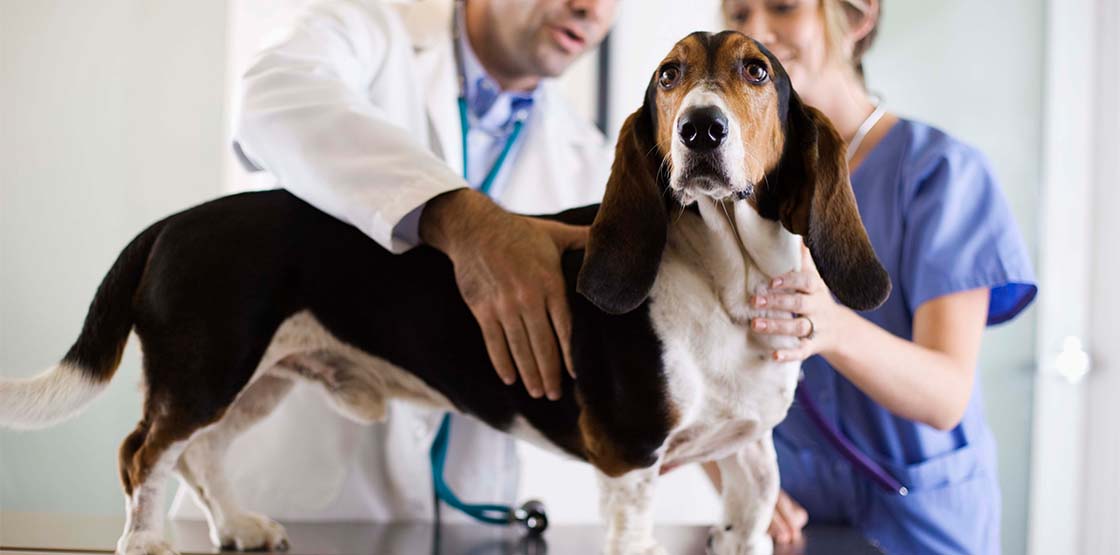How Often Should Dogs Have Checkups?
Regular physical exams are important to keep your pets healthy. Your veterinarian can check for health issues as they arise, such as ear infections and the development of arthritis. During your dog's routine check-up, they can also receive the vaccines they need to help them stay healthy, as well as undergo preventative care checks. So, how often should dogs have checkups? We have the answer for you.
What Is Involved in a Dog's Routine Physical Exam?
A routine physical exam generally starts with a nose to tail physical exam. Your veterinarian will examine your pet's oral health, looking for signs of periodontal disease and teeth that may need to be addressed with a dental cleaning and x-rays. They will check out your dog's eyes and ears, looking for changes suggestive of cataracts, ear infections and more.
Your pet's vitals will be taken, ensuring that they are not running a fever or showing signs of a cardiac arrhythmia. As part of the physical exam, your veterinarian will listen to your dog's chest to assess its heart and lungs, making sure there is no evidence of changes like a heart murmur.
As the exam continues, your veterinarian will be looking for any changes in their skin, including new lumps and bumps, and they will feel their abdomen and lymph nodes. Many veterinarians will also perform a rectal exam on your pet, checking their anal glands, palpating for hernias or masses.
As part of your dog's routine preventative care exam, your veterinarian will often perform diagnostic tests. Your dog should have a heartworm test annually to rule out heartworm disease; many of these tests also check for tick-borne diseases. Fecal exams will be done to check for intestinal parasites. This should be done at least once a year, and as your dog ages, routine blood work and a urinalysis help check for underlying metabolic issues, like kidney disease and diabetes.
Regular Checkups for Your Dog
To answer the question, how often should dogs have checkups, dogs should receive a full physical exam every 6 to 12 months. Particularly as they age, more frequent checkups are important, namely every six months.
When your dog has their checkup, your veterinary team will ask you questions about how they are doing at home: are puppies housebreaking normally, is your dog gaining weight, and is your senior pet drinking more water than normal? These types of questions help tailor the exam and will help your veterinarian make recommendations about potential diagnostic tests.
Many veterinary hospitals and even pet insurance companies are offering bundles on preventative care services for your pet during the year. These can offer significant cost savings and help you provide the preventative care and routine checkups that your dog needs, particularly as they age.
You May Also Like:
Related Search Topics (Ads):
Benefits of Regular Checkups
The number one benefit of regular checkups for your dog is the opportunity to catch health conditions in their early stages. Because pets age faster than people, exams and diagnostics being done more than once a year can help diagnose health issues, such as kidney disease and even lymphoma , earlier than just waiting for clinical signs to crop up at home, such as drinking excessively or having multiple accidents in the house.
Regular physical exams and veterinary visits also ensure your pet receives the preventative care that they need, when they need it. While most people understand that puppies need their puppy shots, did you know that adult dogs also need regular vaccinations? Your veterinary team can also help you pick out the right heartworm and flea and tick prevention products for your dog.
What Can Happen If Your Dog Doesn't Receive Regular Checkups?
If your dog does not receive regular veterinary visits, the chances are greater that they can develop significant health issues that may go unnoticed for a time. This is especially true with insidious diseases such as periodontal disease. You may not notice anything wrong with your dog's mouth until they start dropping kibbles of food out while they are older.
Meanwhile, your veterinarian may have noticed a fractured tooth before it started giving your dog trouble, allowing it to be treated before it caused significant pain and infection.
If your dog is not receiving regular veterinary checkups, they may also be missing out on vital preventative care. Most states require veterinarians to have a valid veterinarian-patient relationship to dispense products such as heartworm prevention. Heartworm disease can be deadly, and the treatment is expensive and painful for your pet if they contract heartworm disease.
Be keeping your pet current with their veterinary visits, you can also make sure they stay current on any of their prevention needs.
In Summary
So, how often should dogs have checkups? Now you know: every 6 to 12 months. Routine physical exams are important for all dogs, particularly as they age. You should take your dog in to see their veterinarian at least once a year, but many organizations recommend twice a year, to help diagnose issues before they become a problem. Ensuring that your dog receives the proper preventative care is one of the best things you can do as a pet owner to help your dog lead a happier and healthier life.

